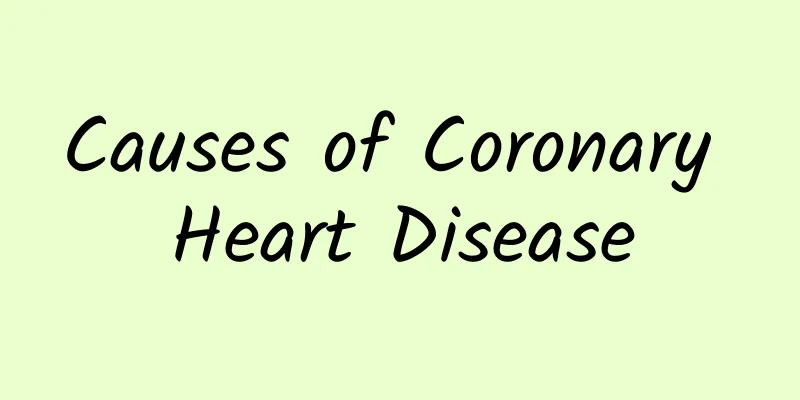Causes of Coronary Heart Disease

|
Coronary heart disease is a disease that falls under the category of heart disease. It will also affect our quality of life. No matter what kind of disease it is, as long as it affects our lives, it will greatly change our living conditions. Therefore, only by clearly grasping their symptoms and the treatment methods to solve these diseases can we help us recover and rehabilitate as soon as possible. The reason is related to whether we will suffer from this disease. Different symptoms bring us different harms, but the same principle applies: they are all caused by different reasons. Therefore, if you want to better treat coronary heart disease, the first thing you need to do is to understand the causes of these diseases and how they are caused. So what exactly causes coronary heart disease? Coronary atherosclerotic heart disease is a heart disease caused by atherosclerotic lesions in the coronary arteries, which causes narrowing or blockage of the blood vessel lumen, resulting in myocardial ischemia, hypoxia or necrosis, and is often called "coronary heart disease." However, the scope of coronary heart disease may be broader, also including inflammation, embolism, etc. that lead to stenosis or occlusion of the lumen. The World Health Organization divides coronary heart disease into five major clinical types: asymptomatic myocardial ischemia (latent coronary heart disease), angina pectoris, myocardial infarction, ischemic heart failure (ischemic heart disease) and sudden death. In clinical practice, it is often divided into stable coronary heart disease and acute coronary syndrome. Age and gender: The incidence of coronary heart disease increases after the age of 40. The incidence in women before menopause is lower than that in men, but is equal to that in men after menopause. Hyperlipidemia: In addition to age, lipid metabolism disorder is the most important predictive factor for coronary heart disease. There is a close relationship between total cholesterol (TC) and low-density lipoprotein cholesterol (LDLC) levels and the risk of coronary heart disease events. For every 1% increase in LDLC levels, the risk of coronary heart disease increases by 2-3%. Triglycerides (TG) are an independent predictor of coronary heart disease, often accompanied by low HDLC and impaired glucose tolerance, the latter two of which are also risk factors for coronary heart disease. Diabetes: Coronary heart disease is the leading cause of death among underage diabetic patients, accounting for nearly 80% of all causes of death and hospitalization rates among diabetic patients. Obesity: It has been identified as the primary risk factor for coronary heart disease and can increase the mortality rate of coronary heart disease. Obesity is defined as a body mass index (BMI = weight (kg) / height squared (m2)) >= 27.8 in men and >= 27.3 in women. BMI is positively correlated with increased TC and TG and decreased HDL-C. Sedentary lifestyle: People who do not like to exercise will double the risk of developing coronary heart disease and dying. There are also genetic, drinking, environmental factors and so on. Hypertension: Hypertension is closely related to the formation and development of coronary atherosclerosis. Systolic blood pressure is a better predictor of coronary heart disease events than diastolic blood pressure. A systolic blood pressure of 140-149 mmHg increases the risk of death from coronary heart disease more than a diastolic blood pressure of 90-94 mmHg. Smoking: Smoking is an important risk factor for coronary heart disease and the only most avoidable cause of death. There is a clear dose-response relationship between coronary heart disease and smoking. Only by correctly understanding the causes of coronary heart disease can we treat the harm it brings in a targeted manner. Coronary heart disease usually occurs after the age of 40, and some people are born with it. Different conditions require the correct approach. Smoking and excessive drinking can also cause coronary heart disease. For some people who are afraid of exercise, the probability of death from coronary heart disease will increase. |
>>: Treatment of sequelae of cerebral infarction
Recommend
There is blood in the leucorrhea just after the menstrual period
For women, leucorrhea can be regarded as a "...
What are the symptoms of placenta growth?
When the fetus is two or three months in the moth...
How to treat kidney deficiency and cold uterus? Recommended dietary therapy for warming uterus and nourishing kidney
Keeping warm is particularly important for women&...
Things to note when qi and blood are insufficient: it is important to pay attention to dietary supplements
The most important thing to pay attention to when...
How to remove oil particles on the face
There are many reasons for the growth of fat part...
What is gout and how is it diagnosed?
What is gout? Many friends are not sure whether t...
How often does a normal person have a bowel movement?
Although constipation is not a very serious disea...
What are the effects and functions of Trichosanthes kirilowii
Trichosanthes is a relatively traditional medicin...
Will I get chickenpox again?
Infants and young children are prone to chickenpo...
Let life flow between your fingers, you can do it too
Guo Chengjie is one of the four representatives o...
How to make homemade pancakes
Making pancakes at home is also a good method. As...
Is urticaria hereditary?
Urticaria is an uncommon disease. There are many ...
Kuba Chinese medicine to nourish the kidney
Generally speaking, if you meet any of the follow...
Side effects and contraindications of Dendrobium flowers
Dendrobium officinale is a Chinese herbal medicin...
What to drink to relieve heat
According to TCM theory, getting "hot" ...









